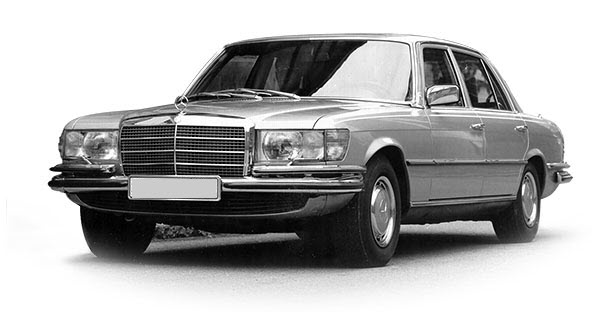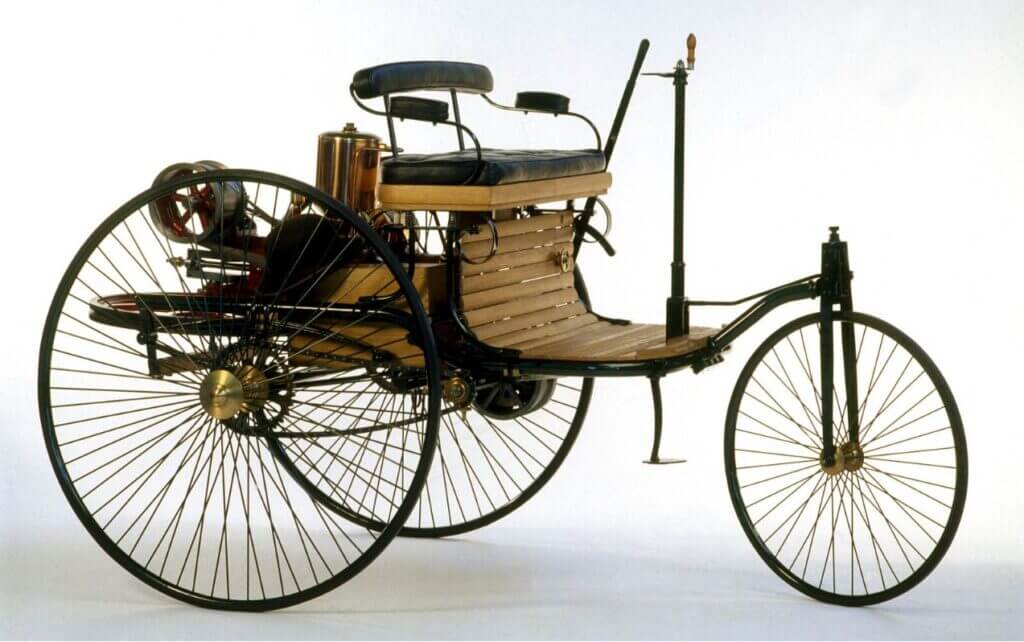
The Birth of Mercedes Benz

The birth of Mercedes Benz began in a small German town, nestled in the heart of Europe, a revolutionary idea was about to change the face of transportation forever.
It was 1886 and the world was stuck in horse-drawn carriages. People dreamed of something more - faster, sleeker, cleaner...and powered by an engine that would shake off its hay-smelling past.
In Karl Benz's hometown of Karlsruhe, Germany, a young inventor with a vision saw it as his mission to revolutionize the way people move.
Karl Benz's Childhood in Germany
Imagine yourself as a young boy growing up in Karlsruhe, Germany in 1844. Life is simple yet vibrant amidst rolling hills and forests of Baden-Württemberg. Your father's workshop beckons you to watch the skilled hands at work, fascinated by the inner workings of machinery.
Your days are filled with curiosity and adventure as you explore the banks of the Rhine River. The gentle rustle of leaves in autumn and spring showers create a soothing symphony that carries your worries away like tiny boat driftwood on a river current.
The memories from these carefree times will later serve as building blocks for creativity, patience, and resourcefulness that would be crucial to laying the foundation of innovation.
Early Life of Karl Friedrich Benz
In a small German town called Pforzheim, one of history's most iconic automobile brands was born from a vision that began to take shape in its streets and workshops. Karl Friedrich Benz, a young inventor with an insatiable curiosity, grew up in this humble setting between 1844 and his eventual move to Mannheim.
Benz's early life was marked by exposure to the mechanical world through his father's locksmith shop and horse-drawn carriage work. This unique blend of traditional craftsmanship and innovation would prove instrumental in shaping Karl Benz's future endeavours. As he delved deeper into the mechanics, a passion for creation began to emerge, fuelling an imagination that would revolutionize transportation forever.
It was here, amidst Pforzheim's early industrial landscape, where Karl Benz first conceptualized his ground-breaking work on gas-powered cars. His initial invention—a pioneering inline single-cylinder engine—represented a pivotal step towards creating the automobile as we know it today. This innovative spark marked the beginning of an extraordinary journey for Karl Benz and laid the foundation for what would become one of history's most beloved automotive brands, born in this very same German town where dreams are made.
The World of Horse-Drawn Transportation
As urban populations in Europe during Karl Benz's time continued to grow, people sought faster and more efficient ways to navigate their daily lives. The horse-drawn carriage, once a symbol of status and luxury, had become increasingly impractical for city dwellers due to its limited space requirements, excessive noise pollution, and cumbersome maintenance needs.
In contrast, bicycles offered a promising alternative during the late 19th century. However, they fell short in terms of comfort and practicality. It wasn't long before Karl Benz set out to address these limitations with his innovative motor vehicle designs. By focusing on creating more comfortable vehicles that could travel farther and faster than horses, Benz paved the way for a revolution in transportation.
The impact of Benz's invention was profound: horse-drawn carriages were eventually replaced by his cleaner, quieter, and safer innovations. As people became increasingly aware of the potential benefits of motorized transportation, Karl Benz assembled a team to help mass-produce the engine and other essential components required for these new technologies. This marked the beginning of Mercedes-Benz's legacy.
As we look at this pivotal moment in history, it becomes clear just how transformative innovation can be in shaping lives today.
What Inspired Karl to Create a Motorized Vehicle?
In Germany during that era, Karl Benz was captivated by horse-drawn carriages but frustrated with their sluggish pace compared to other transportation methods like railroads and ships. He drew inspiration from earlier innovators, including Gottlieb Daimler's internal combustion engine designs. This led him down a path of experimentation, as he sought to create a motorized vehicle that could harness the efficiency of these engines.
As Benz worked through the early stages of development, he was far from alone in his endeavours. Fellow inventors and innovators were exploring similar ideas around this time, driven by the vision for speedier travel on land. Key figures such as Maybach joined Daimler's engine innovations to push progress forward.
People often assume that becoming a great inventor requires years of formal engineering education and a prestigious degree to back it up. However, Karl Benz's remarkable story defies this conventional wisdom. Born in 1844 in Karlsruhe, Germany, Benz took his first steps towards innovation at the tender age of 14 as an apprentice to his father's bicycle shop. There, he honed his mechanical skills by fixing bicycles and manufacturing spare parts.
This hands-on experience sparked a passion for mechanics that would drive Benz forward. He began experimenting with available tools during this period, continually seeking ways to improve existing machines. The internal combustion engine piqued his interest, and its potential inspired him to pursue an ambitious dream: developing a car powered by such an engine.
Undeterred by financial constraints or the skepticism of local officials and business leaders who dismissed his ideas as too radical for investment, Benz remained steadfast in his pursuit. He personally invested heavily from his own funds, testing the boundaries of this new technology and refining its design through rigorous iteration. Eventually, he successfully patented several designs that would become a testament to his vision and ingenuity - forever changing the course of history with them.
In Germany's industrial landscape, horse-drawn carriages had long been a symbol of opulence and prestige. Yet, Karl Benz harboured ambitions that went beyond mere luxury; he envisioned an era where transportation would be revolutionized by machines capable of moving without the aid of horses or steam engines.
One pivotal innovation in this journey was the internal combustion engine – a breakthrough that changed everything.
In 1876, Benz's genius culminated in the creation and development of a single-cylinder four-stroke gasoline-powered engine. Its compact design made it suitable for use in early motorcars, serving as the foundational building block for all modern vehicles to come.
By leveraging this ground-breaking technology, transportation gained an unprecedented level of freedom from traditional limitations – no longer bound by horses or steam engines.
The Benz Patent-Motorwagen: a pioneering automotive achievement
Karl's initial foray into automotive design began in 1885 with the construction of his "Patent Motor Car," affectionately known as the Benz Patent-Motorwagen. This three-wheeled, gasoline-powered marvel was a turning point in transportation history due to its practical application.
This early prototype boasted numerous features still recognizable today: it could travel at an impressive speed of 10 miles per hour, a remarkable feat that laid the groundwork for modern automotive progress.
Karl's partnership with Gottlieb Daimler further honed his design skills, inspiring the development of even more powerful engines. A notable collaboration led to the creation of the "Daimler Benz," boasting improved power and efficiency through its two-cylinder gasoline engine configuration.
Gottlieb Daimler - Karl Benz's Pioneering Rival
In 1885, Germany gave birth to one of Karl Benz's most formidable competitors in automotive innovation – Gottlieb Diamler. Born in 1834, Daimler had a storied career prior to landing at Gasmotorenfabrik Mannheim, where he began experimenting with internal combustion engines using unconventional methods. Drawing inspiration from existing technology, Daimler combined a carburettor from two-stroke engine designs of the time with one or more cylinders arranged on a crankshaft – an innovative stroke-and-inclined cylinder arrangement that paved the way for high-speed internal combustion engines.
This breakthrough led to the creation of Germany's first motorcycle by modifying an old wooden bicycle. With William Maybach joining as his partner and three other investors providing crucial support, Daimler established a small but pioneering business, driven by their shared vision.
Daimler left an indelible mark on automotive history with his development of high-performance engines powered not by expensive coal or wood like Benz's innovative designs but by the efficient use of gasoline – catapulting him onto the forefront as one of Karl Benz' greatest rivals in automotive innovation.
Karl Benz, a name synonymous with innovation and automotive history, left an indelible mark on the world of transportation. Beyond his ingenious inventions, Karl was a passionate car enthusiast who amassed an impressive collection of vehicles that showcased his fascination with mobility and design.
Amongst his extensive portfolio is the three-wheeled, steam-powered Patent-Motorwagen - a pioneering model that paved the way for Mercedes-Benz's early success. Its cutting-edge features set it apart from its contemporaries, solidifying its place as one of the company's most significant models to date.
Benz was not just an inventor; he also had a discerning eye for design and style. The Benz Velo, with its sleek profile and powerful engine capable of accelerating from 0-20 km/h in three seconds, is often considered the first "sports" vehicle of its time. This innovative ride boasted an impressive feature that set it apart - a sidecar designed to enhance visibility, comfort, and safety for the driver.
Karl's involvement in designing horse-drawn vehicles was equally noteworthy. His designs during this period showcased his attention to detail and dedication to creating functional yet stylish modes of transportation.
The Benz Patent-Motorwagen Type IV is another early model worth mentioning. As one of the first four-wheeled automobiles ever produced, it boasted an impressive three-speed transmission that could shift gears while in motion - a remarkable feat for its time. The wooden bodywork may have had its limitations, but this pioneering vehicle marked a significant milestone in automotive history.
Karl's fascination with innovative transportation extended beyond his designs; he also collected unique vehicles like the horseless carriage. His relentless pursuit of progress and dedication to pushing boundaries left an enduring legacy that continues to inspire generations of car enthusiasts and innovators today.

The Benz Patent-Motorwagen Type IV
Germany and the Birthplace of Mercedes-Benz
Karl Benz's ingenuity revolutionized transportation in 1888 with his innovative gas-powered engine, setting a new standard for speed and efficiency that would eventually establish Germany as a global automotive leader. His early motorcar design boasted three wheels but evolved into the four-wheeled vehicle we know today, complete with safety features like brakes.
Benz's pioneering work caught the attention of Gottlieb Daimler, who was inspired by Benz's internal combustion engine concept to develop his own ground-breaking technology. Meanwhile, Wilhelm Maybach made a name for himself as an exceptional engineer by creating a high-performance motor that marked the beginning of a new era in transportation speed and efficiency.
The impact of Karl Benz's vision extended far beyond his time period. His legacy endured through subsequent leadership, including Daimler's involvement with Benz & Cie., which merged in 1926 to form what is now known as Mercedes-Benz. This milestone solidified the company's position on the world map as a leader in innovative automotive design and manufacturing.
The name "Mercedes-Benz" has become synonymous with exceptional engineering, speed, and reliability. The next time you hear this iconic brand mentioned, recall Karl Benz's pioneering spirit that paved the way for it: a trailblazer who transformed transportation forever by harnessing the power of gas-powered engines.
The Origin of "Mercedes" as we know it today?
The Mercedes-Benz name is synonymous with luxury and innovation, but it has a fascinating history that stretches back to its German roots. At its core lies Karl Benz, a visionary inventor who laid the foundation for one of the world's most iconic car brands.
The "Mercedes" part of the name, however, originates from an unexpected source: Emilie Jelinek - affectionately known as Bertha Benz. This trailblazing entrepreneur was instrumental in driving transportation innovation forward with her pioneering spirit and financial backing. Her unwavering support enabled Karl Benz to pursue his ground-breaking work on the first gasoline-powered vehicles.
When Karl unveiled the Patent Motorwagen in 1886, he proudly named it after his loving wife Bertha - a testament to their enduring love story. Over time, the name Mercedes-Benz became synonymous with speed, sophistication, and style that German automobile enthusiasts still adore today.
A First Glimpse at the World's first gas-powered car
In a world where horse-drawn carriages were the norm, Karl Benz dared to dream big. In 1886, in Baden-Württemberg's Fatherland region, he revolutionized transportation with his ground-breaking invention – the Mercedes-Benz brand was born from this momentous day.
A century earlier, Nikolaus August Otto had laid the foundation for modern engines when he created the first internal combustion engine in Germany. Building upon Otto's concept, Karl Benz pushed beyond conventional boundaries by inventing a three-wheeled gas-powered vehicle known as the Patent-Motorwagen. This pioneering car featured a single cylinder engine and marked the beginning of automotive history.
On January 29th, 1886, Karl Benz patented his ingenious creation in Mannheim – an event that paved the way for one of the world's most iconic brands. By combining Otto's ideas with innovative thinking, Benz created something entirely new: a vehicle powered by gasoline that would change the face of mobility forever.
This pivotal moment not only set Mercedes-Benz on its course to become a household name but also sparked a wave of experimentation among early engineers, driving them to push the limits of innovation and technological advancements.
Germany's automotive history is forever tied to Karl Benz, who laid the groundwork for what would become one of its most iconic brands. His pioneering spirit and innovative designs paved the way not only for Mercedes-Benz but also inspired generations of engineers, mechanics, and visionaries in Germany.
The world was forever changed by Karl Benz's dreams which began with a humble horse-drawn carriage to soaring gas-powered visions that put humanity into motion. From this modest beginning rose an automotive powerhouse - today driving innovation forward on every road across the globe.
The lasting impact of Karl Benz is not only evident through the success story of Mercedes-Benz but in the countless people working tirelessly behind closed doors to push boundaries and create something new.
As you delve deeper into the world of automobiles, it becomes clear that history's footprints are left all over. Each brand - from small start ups to global giants like Mercedes-Benz - owe a debt to Karl Benz for opening up this road and giving future generations access keys at their hands.
Mercedes-Benz remains an iconic symbol not only of German innovation but also the unwavering spirit which pushes us beyond our dreams, striving every day toward greatness. The journey of Karl Benz continues as a reminder that with great power comes great responsibility to honour it by moving forward.
Germany's automotive history is forever tied to Karl Benz, who laid the groundwork for what would become one of its most iconic brands. His pioneering spirit and innovative designs paved the way not only for Mercedes-Benz but also inspired generations of engineers, mechanics, and visionaries in Germany.
The world was forever changed by Karl Benz's dreams which began with a humble horse-drawn carriage to soaring gas-powered visions that put humanity into motion. From this modest beginning rose an automotive powerhouse - today driving innovation forward on every road across the globe.
The lasting impact of Karl Benz is not only evident through the success story of Mercedes-Benz but in the countless people working tirelessly behind closed doors to push boundaries and create something new.
As you delve deeper into the world of automobiles, it becomes clear that history's footprints are left all over. Each brand - from small start ups to global giants like Mercedes-Benz - owe a debt to Karl Benz for opening up this road and giving future generations access keys at their hands.
Mercedes-Benz remains an iconic symbol not only of German innovation but also the unwavering spirit which pushes us beyond our dreams, striving every day toward greatness. The journey of Karl Benz continues as a reminder that with great power comes great responsibility to honour it by moving forward.
